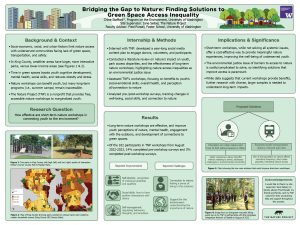Bridging the Gap to Nature: Finding Solutions to Green Space Access Inequality
The positive impact of time spent in nature on youth mental and physical health is well-documented, yet all communities do not have equitable access to natural areas. Furthermore, disparities in green space access are often correlated with demographic factors, creating barriers to access to nature, particularly in underserved communities. This study investigates the effectiveness of short-term immersive nature workshops in mitigating these disparities and enhancing youth development, and how these workshops can be improved. Thus, this study aims to establish the connection between green space exposure and youth health outcomes, explore green space access as an environmental justice issue, and evaluate the effectiveness of brief nature workshops, specifically those offered by The Nature Project (TNP). To accomplish this task, I completed a literature review and analyzed findings from TNP participant surveys. Participant survey results indicated improvements in positive identity, self-management, and social skills, though challenges remain in fostering a deeper connection to nature and environmental support. The results of this study highlight the potential of short-term interventions to provide significant benefits to youth despite ongoing barriers to access. However, the limited sample size and response rate suggest the need for further research to validate these findings and explore long-term impacts. Short-term workshops could be more effective if there is a greater focus on environmental education within short-term workshops, and more widespread collaboration with community centers to improve transportation to workshops, recognition of the organization’s mission, and community support.
